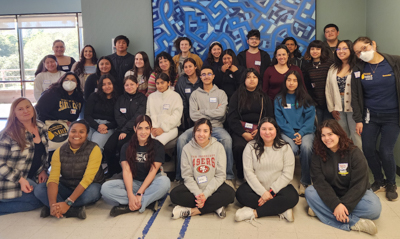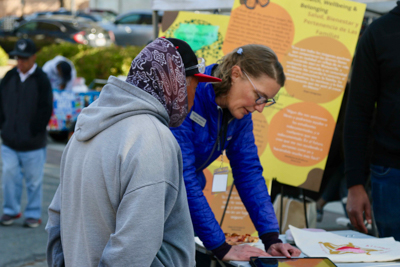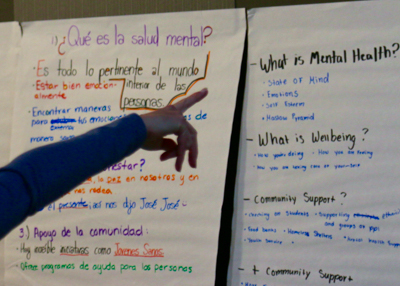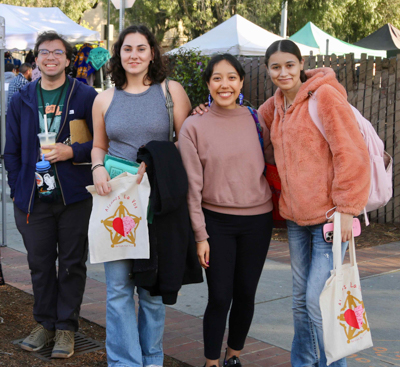Santa Cruz County youth aim to improve community mental health through better support for immigrants
April 04, 2024
SHARE THIS STORY:TwitterFacebookLinkedInReddit
A three-year partnership between UC Santa Cruz and United Way to empower young change-makers is wrapping up this spring, with youth leaders from across Santa Cruz County preparing to distribute resource kits for local immigrants. It’s the final step in a long journey of organizing, research, and action intended to bring about positive social change.

Members of the United Way of Santa Cruz County’s Youth Action Network, including Gabriel Melgoza (second row, center) gather with United Way staff and UC Santa Cruz faculty and students to work on a youth participatory action research project. Photo: United Way of Santa Cruz County
“It’s all coming to life, and it’s really gratifying,” said Gabriel Melgoza, a Watsonville High School student and youth leader for the project. “We’re trying to support our community, uplift them, and give our community and our friends and family the help that they deserve and need. Being able to give back makes me feel like I can change the world.”

UC Santa Cruz Psychology Professor Regina Langhout helps to collect responses to a survey designed with the youth to explore factors that impact mental health in local communities. Photo: United Way of Santa Cruz County
The project is an example of youth participatory action research (YPAR), a model where professional researchers and local youth co-develop efforts to answer questions that matter to the community. In the process, youth participants learn new research and leadership skills and apply the findings of their research to address local needs.

The youth decided to focus the project on mental health and how it connects to community well-being. Photo: United Way of Santa Cruz County
The current effort began in 2021, with a $650,000 grant that linked United Way of Santa Cruz County’s Youth Action Network with UC Santa Cruz researchers through the new Campus + Community center, led by Sociology Professor Rebecca London. UCSC faculty and undergraduate mentors worked with groups of high school and middle school students from United Way’s countywide youth network to develop a research agenda.

Based on the findings of their research, youth will develop and distribute resource kits that include information on housing, health, legal, food, and educational services for immigrants, along with a tote bag and other items. Photo: United Way of Santa Cruz County
Youth-led research identifies community needs
The team decided on their research topic and methods and collected data over the course of the 2022-2023 academic year. The students chose to focus on mental health, in connection with United Way’s Jóvenes Sanos initiative, and they named their project Alzamoz la Voz, or “raising our voices”. Psychology Professor Regina Langhout, who advised students through the research development stage, said the youth had an expansive understanding of mental health.
“The youth wanted to talk about everything from the challenges of income and housing instability, to immigration raids, to how institutions in the county support us,” she said. “They linked all of these issues to mental health and community well-being.”
To study these issues, the youth developed a community-wide survey of residents aged 11 and up, with support from Langhout and UCSC undergraduates. The survey was designed to explore the social contexts and environmental causes that impact mental health in local communities and to identify societal changes that could increase community well-being.
Youth leaders worked with Sociology Professor Steve McKay and undergraduates in his community-engaged research course to conduct the survey across the county. UCSC researchers then analyzed the resulting data, based on youth research questions, and shared it back to a new cohort of students at the start of the 2023-2024 academic year.
As the team discussed the findings, several social factors emerged from the data that impacted community well-being: access to neighborhood resources, neighborhood design, experiences with racial discrimination, and immigrant safety. The youth decided to focus especially on immigrant safety.
The surveys showed that higher life satisfaction for Santa Cruz County residents was related to lower levels of fear and concern about the impact of immigration enforcement in the community and higher levels of satisfaction with how police, schools, hospitals, and social services provide care and safety to immigrants—without discrimination or bad treatment.
The surveys also showed that a wide range of people could benefit from improvements in those areas. People with the highest levels of fear and concern about immigration enforcement were 16-18 year-olds from southern parts of the county who identified at Latinx and whose parents had less than a high school degree. But those least satisfied with how institutions are supporting immigrants were white or multiracial females between the ages of 19 and 35 or over 51 who resided in northern parts of the county and whose parents had a college degree.
Taking action to improve community well-being
Equipped with perspective from their research, the youth started planning for how they could make a difference. UCSC Assistant Professor of Psychology Saskias Casanova, Latin American and Latino Studies Professor Jessica Taft, and UCSC undergraduates supported the youth leaders in that process.
“From the survey findings, the youth identified immigrant safety as an area where they felt they could really have a positive impact to benefit the whole community,” Casanova said. “For a community to thrive, all groups in that community need to feel a sense of safety and security. That’s something we saw clearly in the research findings, and it really resonated with the youth.”
After a series of planning workshops, the team decided to help spread awareness of current resources for immigrants, so that those in need would be better able to access help. The youth developed resource kits that included information on housing, health, legal, food, and educational services for immigrants, along with a tote bag, booklet, magnet, and other items.
Throughout April and May, the team will work with partner organizations to distribute the kits across the county, and they’re excited about the benefits that could result. But UC Santa Cruz Professor Jessica Taft, who studies youth activism, says the true impact of this project is even greater than the immediate results of distributing the resource kits. It’s also about the effect that taking this action has on the youth themselves.
“The entire YPAR model of research bolsters youth's sense of agency, so that they are empowered to continue advocating for the needs of their community,” she explained. “This type of research also encourages adults to ask ourselves what we can learn from young people, which is something we should be doing a lot more of as a society.”
Pamela Velazquez, Senior Community Impact Manager for United Way of Santa Cruz County, agrees that the project demonstrates just how imperative it is to have these students, many of whom are BIPOC and potential first-generation college applicants, at the forefront of research efforts.
“One of our main goals is to support the students in seeing themselves in higher education and bridge the gap between South County and UC Santa Cruz,” Velazquez said. “It will be really exciting to see what systemic shifts we can make in the community.”
